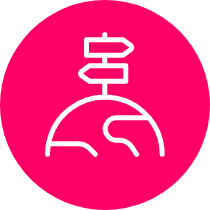About Sydney Child
Health Program
Our program is designed for professionals who are looking to develop paediatric skills to improve the health and wellbeing of children and young people. Delivered by over 100 expert clinicians, SCHP provides best-evidence current practices across 30 paediatric subspecialties.
Delivered 100% online, you will gain the skills, knowledge and confidence to identify, assess and manage common paediatric issues. You will evaluate how social determinants can impact the care for children and make a greater impact in your role in advocating for paediatric patients.
Who’s it for?
SCHP is an online continuing professional development program developed by health professionals for health professionals. It is suitable for:
General practitioners
General Practitioners, GP Registrars and International Medical Graduates undergoing GP training.
Nurses
Registered Nurses, Clinical Nurse Consultants and Nurse Practitioners
Health professionals
Dental Practitioners, Occupational Therapists, Physiotherapists, Speech Pathologists, Psychologists, Dieticians, Pharmacists, and any other allied health professional treating children and young adolescents
Hospital doctors
Interns, Resident Medical Officers, Career Medical Officers and Registrars.
Trainees
Pediatric trainees, Neonatal trainees, Psychiatric and Mental Health trainees, Emergency trainees, Surgical trainees
Medical students
Final year medical students
 International students
International students
Over the years SCHP has grown to a global reach of more than 10,000 alumni from over 40 countries. The flexibility, accessibility and self-paced learning environment provides the opportunity for any individual health professional to complete the program from anywhere in the world.
SCHP has established local support sites in more than 20 developing countries to complement the program through study groups and encourage discussions around its local context.
Feedback received from our alumni reveals the program has benefited their day-to-day practice tremendously with 99.5% of our participants reporting that they have improved their knowledge and their confidence in dealing with children and adolescence and 99.4% would recommend the program to others.
Learning outcomes
The program is divided into nine modules which reflect a journey of learning in paediatric education covering areas from neonates to adolescents. Upon completion, participants can expect to:
Assessment
Assess a child using paediatric history and examination techniques including a developmental assessment, recognise ‘Red Flag’ presentations, and communicate your findings with the child and their family.
Investigation
Organise and interpret necessary investigations to assist with reaching a diagnosis in a timely manner whilst avoiding unnecessary costly and painful procedures.
Management
Formulate evidence-based management plans for common acute and chronic paediatric conditions that can be personalised and adapted for each patient’s individual circumstances.
Advocacy
Implement strategies that recognise and correct for health inequities in our health system and make a tangible difference to the health and well-being of young people.
Learning modules
Over 100 Webcasts form the core of the program content. The table shows the nine modules and the recommended time it takes to complete watching the webcasts.
9 webcasts
|
8 hours
- Examination of the Newborn
- Graduates of Neonatal Intensive Care
- Neonatal Jaundice
- Health Issues in Disadvantaged Children
- Immunisation
- Apnoea in Infants & Sudden Infant Death Syndrome
- Lactation and its challenges
- Infant Nutrition and Toddler Feeding
- Issues in Infancy: Crying, Sleeping and Family
14 webcasts
|
13 hours
- Autism Spectrum Disorder
- Developmental Growth & Assessment
- Behavioural Problems in School Age
- Children/Infants/Toddlers
- Speech and Communication Problems in Children
- Health Issues in Indigenous Children
- Common Problems in Children with Disabilities
- Child Development and the GP
- Failure to Thrive
- Role of Culture in Child Health and Development
- Engaging Children
- Behaviour and Attention
- Overview of Child Protection
- Child Physical Abuse
- Child Sexual Abuse
13 webcasts
|
10.5 hours
- Cardiac Disease of the Newborn
- Paediatric Cardiology
- Ear Nose and Throat 1 – Paediatric Upper Airway
- Ear Nose and Throat 2 – Outer and Middle Ear Conditions
- Hearing Loss and Deafness in Children
- Pneumonia
- Acute Asthma – Parts 1 & 2
- Cases of Asthma or not Asthma
- Paediatric Asthma Management
- Chronic Asthma
- Acute Upper Airway Obstruction
- Bronchiolitis
- Chronic Suppurative Lung Disease in Children
9 webcasts
|
7.5 hours
- Chronic Diarrhoea
- Gastroenteritis
- Liver Disease in Children
- Recurrent Abdominal Pain in Children
- Inflammatory Bowel Disease
- Antibiotics and Resistance
- Exanthems
- Meningitis
- Tuberculosis in Children
18 webcasts
|
15 hours
- Atopic Dermatitis
- Birthmarks
- Paediatric Skin Infections
- Rheumatic Diseases in Children
- Arthritis in Children
- Approach to Childhood Malignancy
- Paediatric Pain Management
- Paediatric Palliative Care
- Urinary and Faecal Incontinence in Children
- Haematuria and Proteinuria
- Hypertension in Children
- Urinary Tract Infection and Vesico Ureteric Reflux
- Anaemia
- Bruising and Bleeding in Children
- Neutrophil and Platelet Disorders
- Allergy and Allergic Diseases
- Allergy and Immunology
- Anaphylaxis Management
9 webcasts
|
7.5 hours
- Demystifying Inborn Errors of Metabolism
- Genetic Tests in Paediatrics - Choices and Challenges
- Normal Puberty and Disorders of Puberty
- Nutritional Rickets in Children
- Growth Disorders in Children
- Diabetes Mellitus
- Paediatric Endocrine Emergencies
- Disorders of Sex Development
- Obesity
9 webcasts
|
7 hours
- The Fitting Child
- Childhood Epilepsy
- Seizure Mimickers in Children
- Approach to the Child with Weakness
- Headaches in Children
- Neural Tube Disorders
- Understanding Neurosurgery for General Practitioners
- Brain Injuries
- Cerebral Palsy
20 webcasts
|
17 hours
- Paediatric Dentistry
- Common Eye Disorders in Childhood
- Approach to the Febrile Child
- Paediatric Resuscitation
- Acute Abdomen
- Burns
- Common Surgical Problems ‘North’
- Common Surgical Problems ‘South’
- Intussusception and Bowel Obstruction
- Paediatric Trauma
- Abdominal Imaging
- Chest Imaging
- Paediatric Musculoskeletal Imaging
- Nuclear Medicine
- Bone and Joint Infections
- Childhood Fractures
- Postural Problems in Childhood
- The Limping Child
- Toxicology
- Child Mortality and Injury Prevention
12 webcasts
|
9.5 hours
- Difficulties Dealing with Parents
- Adolescent sexuality and sexual Health: Beyond Biology
- Approach to Adolescents
- Chronic Illness in Adolescents
- Eating Disorders
- Acute Mental Health Assessment of Children
- Anxiety Disorders in Children and Adolescents
- Child Mental Health for Paediatricians & General Practitioners
- Mood Disorders and Suicide
- Paediatric Sports Medicine
- Concussion
- Paediatric and Adolescent Gynaecology
Assessments
SCHP assessments are designed to put your learning to the test. Each assessment will challenge your ability to apply theory and critical reasoning to real world challenges. Complete all assessments to receive a ‘Certificate of Completion’ and a solid foundation in paediatric health.
To be completed online as part of the Learning Pathway.
Health Inequity Case Report
Medical Case Report
Oral Assessment Task

Available online from home
Final MCQ Exam
Extracurricular activities
Take part in our extracurricular activities provided to help you build your skills and establish connections with the community:
Seven live webinars annually hosted and recorded online.
Monthly Case Journals
Annual Practical Paediatrics for GPs Conference held at The Children’s Hospital at Westmead, Sydney.
Annual 3-day Clinical Workshop held at The Children’s Hospital at Westmead, Sydney
Community Child Health Visits facilitated for Sydney participants
Independent study groups
Additional learning resources include links to free e-journals, Kids Health Fact Sheets to enhance your communication with Parents and Carers, online National Prescribing Curriculum – paediatric modules, and additional non-examinable webcasts.
